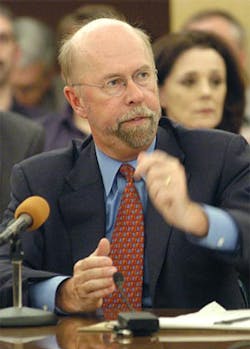NWA Chief Testifies Before the Minn. Senate Trans. Committee
What promised to be a testy Senate committee grilling of Northwest Airlines CEO Doug Steenland about the carrier's operations and business plans largely turned into lecture Tuesday -- a lecture by Steenland about the struggling airline's problems and prospects.
Last week, Steenland, under threat of subpoena, agreed to testify before the state Senate Transportation Committee. The committee said it wanted him or another high-level Northwest executive to respond to questions about the airline's business plans and the effect on airline jobs of a proposed $860 million expansion of the Minneapolis-St. Paul International Airport.
Northwest is supporting the airport expansion.
But Steenland told senators nothing Tuesday that he has not repeatedly told Wall Street and Northwest employees.
The gist: We've lost about $2.5 billion in the past four years. But if we get $1.1 billion in annual labor concessions from our employees, we have a sound business plan that positions us for success.... And, yes, we're committed to Minnesota, where we still employ about 16,000 people, who earn about $1 billion a year between them.
Northwest is in a position "where our cost of doing business exceeds the revenue we produce," Steenland explained.
"By any measure, our labor costs are too high," he said. "We must now lower our labor costs to compete effectively with other airlines and to return to profitability." Steenland was never flustered by any question pitched his way. He was not pressed hard on hot-button topics such as the outsourcing of aircraft maintenance work. Actually, going into the hearing, the committee agreed that he wouldn't have to answer any labor questions.
In a question-and-answer session after Steenland's presentation, senators asked him about matters such as the removal of pillows from Northwest planes, the prospects for in-flight cell phone use, airfares to Atlanta and Northwest's views on Twin Cities metro-area reliever airports.
Leaders of the Aircraft Mechanics Fraternal Association had hoped that Northwest would be held "accountable" by the committee for job cuts that, in the union's view, violate agreements Northwest made with the state in the 1990s.
In recent years, some 3,600 of the union's members have been laid off. And the union fears another 1,000 may lose their jobs.
"There were a lot of softball questions," Ted Ludwig, local president of Northwest's mechanics union said of the committee's interaction with Steenland. "It's nice to be treated like royalty."
Slightly more than a decade ago, state lawmakers approved a plan to provide the Eagan, Minn.-based carrier with hundreds of million of dollars in financing help in exchange for job guarantees and other commitments, such as keeping its headquarters in Minnesota.
Northwest is about 700 employs short of the Minnesota employment target set in an agreement with the state, Steenland said. But he noted that Northwest is allowed to fall short of the target when it faces tough economic times, changing business conditions and other events beyond its control.
